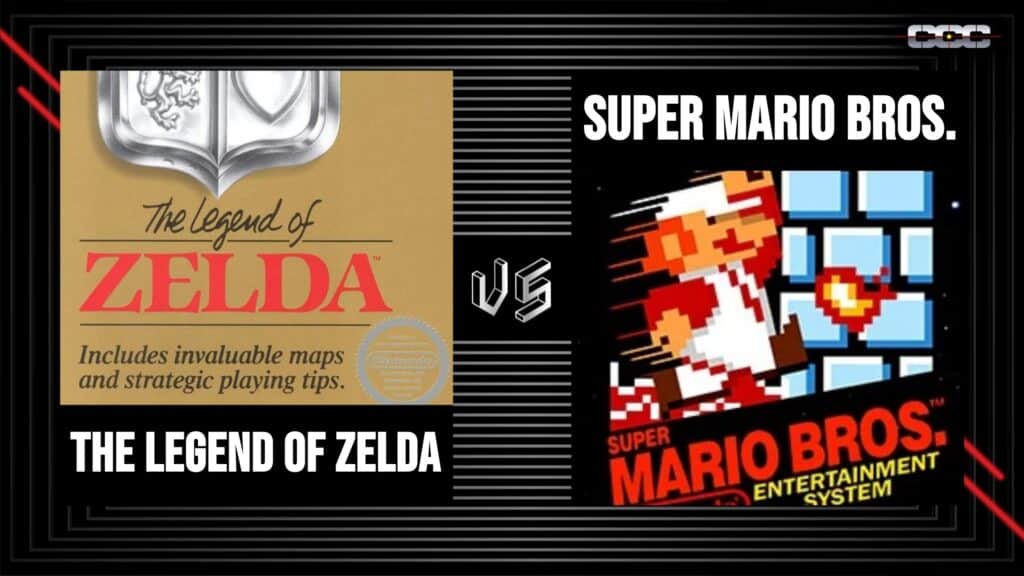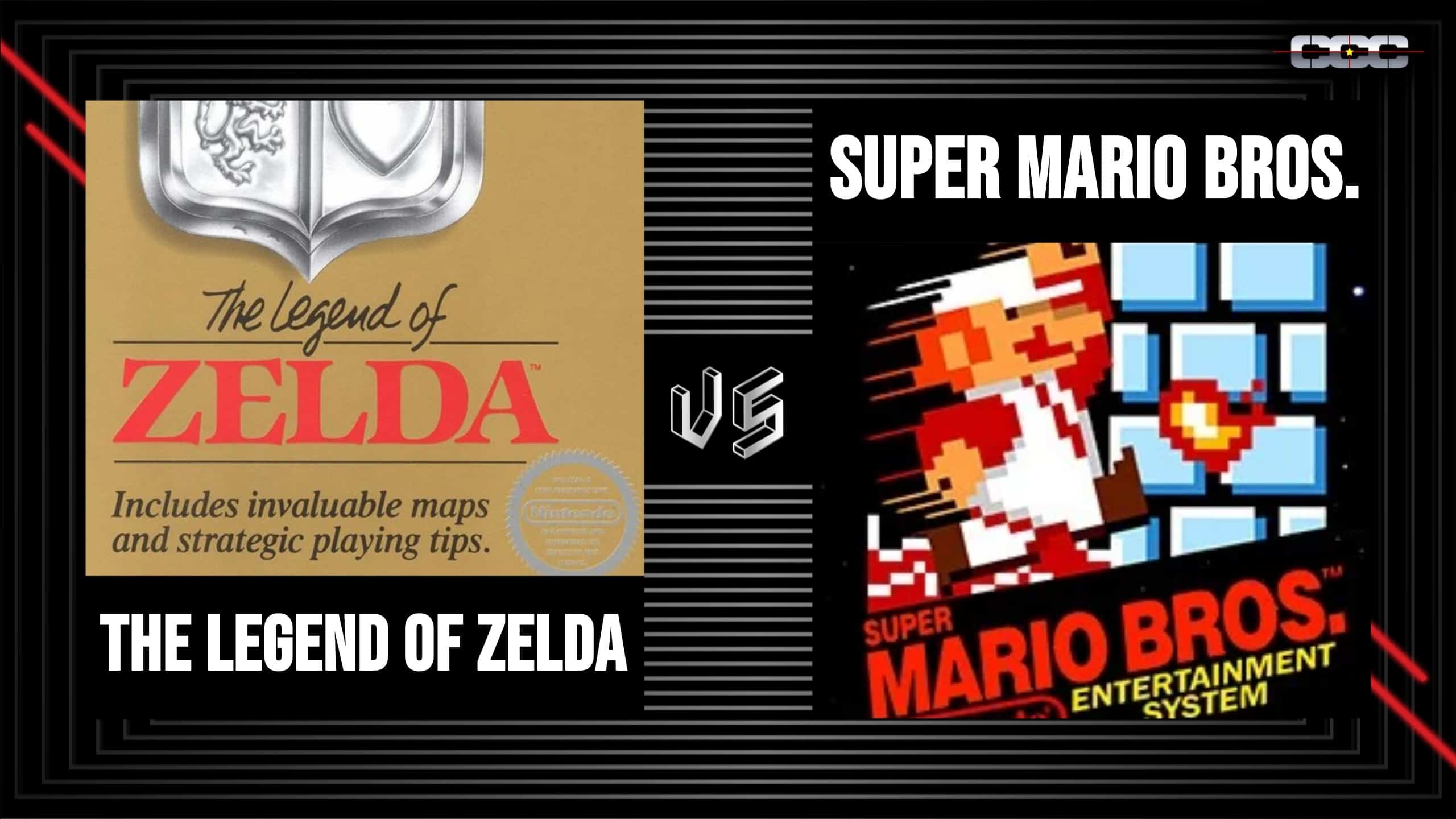It’s rare for a series to have the kind of staying power that both the Zelda and Mario franchises have. Even rarer still for any series to have an enduring popularity and high bar of quality that lasts for more than 35 years. But, let’s be honest, these aren’t your average game series. These are the two franchises that almost single-handedly defined the gaming landscape and transformed the medium of video games moving forward. Not only are Mario and Zelda responsible for the success of the NES, they’re responsible for the phoenix-like rebirth of the medium following the 1983 industry crash.
So it begs the question then of “which series is more instrumental to the success of the NES?”. Both Mario and Zelda are landmark titles in the early years of the NES. Both are the only two Nintendo franchises to have releases on every generation of Nintendo hardware. And, lest we forget, the Mario and Zelda franchises are indisputably the highest-rated game series of all-time, with Ocarina of Time for the N64 holding the distinction of being the highest-rated game ever according to review aggregate site Metacritic. However, cumulative success and acclaim aside, which series defined the NES? Let’s find out.
The Legend of Zelda vs Super Mario Bros.: Side-by-Side Comparison

In terms of impact, it’s hard to find two games more important to the medium than Super Mario Bros. and The Legend of Zelda. Both of these titles helped make the NES the must-have toy from 1986-1988, and both series imprinted a lifelong hobby of gaming on millions of individuals who themselves would go on to design and develop games. Unsurprisingly, these titles share a lot in common outside of both being first-party Nintendo titles and creations of Shigeru Miyamoto.
| Characteristic | Super Mario Bros. | The Legend of Zelda |
|---|---|---|
| Different Releases on NES | 3 | 2 |
| # of Sequels on NES | 2 | 1 |
| Creator | Shigeru Miyamoto | Shigeru Miyamoto |
| Total Sales | 40 million | 6.51 million |
| Year of Release | 1985 | 1986 (JP) 1987 (NA) |
| System Pack-In? | ✅ | |
| Completed in One Sitting? | ✅ | |
| Secrets? | ✅ | ✅ |
The Legend of Zelda vs Super Mario Bros.: 5 Must-Know Facts
Here are some must-know facts about Super Mario Bros. and The Legend of Zelda:
- Both Super Mario Bros. and The Legend of Zelda are the brainchild of industry luminary Shigeru Miyamoto. Though he has since passed on stewardship of both franchises to other talented developers and producers at Nintendo, he is perhaps one of the most important single figures in the medium of video games.
- The NES was a cultural phenomenon in the West but it was not until 1986 and 1987 that the system became the must-have toy for millions of American children. The success of Super Mario Bros. was a major factor in helping the NES gain a foothold in the West.
- Prior to The Legend of Zelda, many NES games were simply ports of popular arcade titles. It wasn’t until Zelda‘s arrival in the West that many gamers even contemplated the idea of saving a game and returning to it later. Alongside its astounding innovation in gameplay and unprecedented sense of freedom, The Legend of Zelda inspired other developers to make games catered specifically for home consoles.
- Super Mario Bros. isn’t just an important NES game, it’s a massive cultural milestone. In addition to a multimedia empire that it helped spawn, the title was one of the first (and still most-played) speed-running challenges.
- Speaking of speed-running, both Super Mario Bros. and The Legend of Zelda are iconic for their many subtle glitches. Players all over the world have spent so much time with each title that they’ve figured out ways to exploit and utilize these glitches to break the games.
The Legend of Zelda vs Super Mario Bros.: The System Pack-In
In terms of which entry is more responsible for the NES’ success, it’s hard to argue against Super Mario Bros. Since the title came as a pack-in with the NES system, millions more players got their hands on the title than on Zelda. Additionally, SMB would continue to be the system pack-in well into the console’s lifespan. Instead of switching out the title for a different game, Nintendo instead would bundle other titles with it on a single ROM cartridge. This is how we ended up with millions of Super Mario Bros./Duck Hunt cartridges in circulation. Had Nintendo offered fans an opportunity to have The Legend of Zelda as a system pack-in, it’s likely that its sales numbers would be much greater.
The Legend of Zelda vs Super Mario Bros.: One Almost Never Came Stateside
The story of how The Legend of Zelda came to the US is one of the greatest near-misses in video game history. Originally releasing as a launch title for the Famicom Disk System, the Japanese version of Zelda initially arrived as a diskette for the Japan-only peripheral. Because there were no plans to release the FDS stateside, it took Nintendo’s internal engineers a long time to figure out how to port the game to a ROM cartridge. The biggest issue was the ability for the cartridge to read save files from the chipset, requiring massive amounts of memory that ROM cartridges simply didn’t have.
However, roughly a month before the game was ported to the NES, the MMC-1 was developed. This chip allowed for Nintendo’s developers to use an internal lithium battery in the ROM cartridges to power the chip and its accessing of separate memory for save files. Not only did this chip help bring The Legend of Zelda over to the West in cartridge format, it helped bring Kid Icarus over that same year and allowed for Dragon Quest (Dragon Warrior in North America) and Final Fantasy to make their way stateside as well.
The Legend of Zelda vs Super Mario Bros.: Number of NES Sequels
When considering which series has the greatest lasting impact on the NES, one would be remiss to not mention sequels. While Super Mario Bros. has two sequels on the NES, The Legend of Zelda only has one. Additionally, audiences in the West were not prepared for the departure Zelda II represented from the original game. Not just a shift in perspective from overhead to side-scrolling, Zelda II is a very difficult and obtuse game. The original Zelda required plenty of amateur sleuthing and map-making, but Zelda II: The Adventure of Link is labyrinthine in comparison. It’s looked back on more fondly now for how it experimented with the established gameplay formula, but Zelda II is undoubtedly the black sheep of the franchise.
Now, compare that to Super Mario Bros.‘ two sequels on the NES. While Super Mario Bros. 2 is indeed a departure (and not even the “real” sequel to Super Mario Bros.) it’s still very much in-line with what fans had come to expect from a Mario game. And of course, Super Mario Bros. 3 is often considered to be the best game in the series still to this day. SMB3 is a feat of game design and platforming genius that is very rarely repeated in the medium of video games and is, rightly so, considered to be one of the best games ever made. In terms of which series had the better NES-era sequels, it’s no contest. Super Mario Bros. reigns supreme.
Bottom Line
In terms of which series has the greatest impact on the NES and Nintendo’s establishing of a foothold in the West, it’s most definitely Mario. While Zelda arguably has the greater design and innovation impact on the industry, without the commercial success and cultural movement that Mario inspired, Zelda would have never even come to the US. However, to think that gamers nearly missed out on one of the greatest series of all-time due to a technological innovation is astounding. Both series are incredibly important not just to the NES but to gaming in general, with this year alone being dominated by the latest release in the Zelda franchise. Mario may have the sales numbers and the position as a system pack-in, but The Legend of Zelda just might be the most historically important video game ever released.
